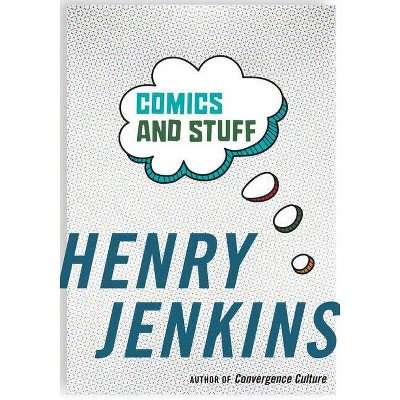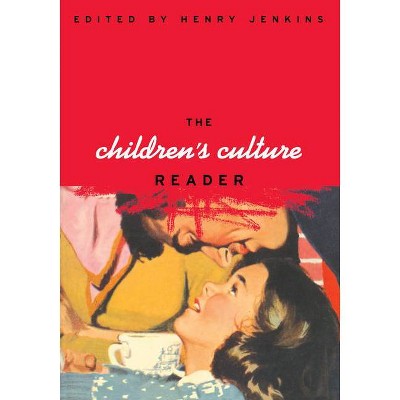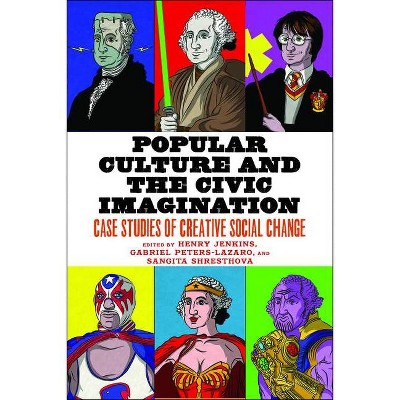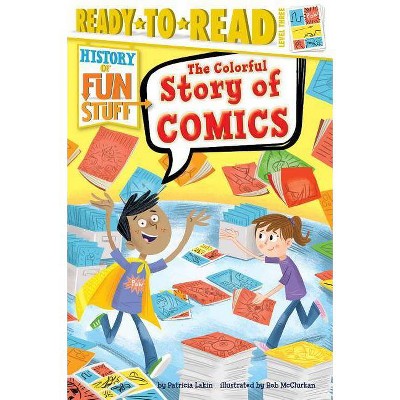Comics and Stuff - by Henry Jenkins (Paperback)

Similar Products
Products of same category from the store
AllProduct info
<p/><br></br><p><b> Book Synopsis </b></p></br></br><p><b>Considers how comics display our everyday stuff--junk drawers, bookshelves, attics--as a way into understanding how we represent ourselves now</b> <p/>For most of their history, comics were widely understood as disposable--you read them and discarded them, and the pulp paper they were printed on decomposed over time. Today, comic books have been rebranded as graphic novels--clothbound high-gloss volumes that can be purchased in bookstores, checked out of libraries, and displayed proudly on bookshelves. They are reviewed by serious critics and studied in university classrooms. A medium once considered trash has been transformed into a respectable, if not elite, genre. <p/>While the American comics of the past were about hyperbolic battles between good and evil, most of today's graphic novels focus on everyday personal experiences. Contemporary culture is awash with stuff. They give vivid expression to a culture preoccupied with the processes of circulation and appraisal, accumulation and possession. By design, comics encourage the reader to scan the landscape, to pay attention to the physical objects that fill our lives and constitute our familiar surroundings. Because comics take place in a completely fabricated world, everything is there intentionally. Comics are stuff; comics tell stories about stuff; and they display stuff. <p/>When we use the phrase "and stuff" in everyday speech, we often mean something vague, something like "etcetera." In this book, stuff refers not only to physical objects, but also to the emotions, sentimental attachments, and nostalgic longings that we express--or hold at bay--through our relationships with stuff. <p/>In <i>Comics and Stuff</i>, his first solo authored book in over a decade, pioneering media scholar Henry Jenkins moves through anthropology, material culture, literary criticism, and art history to resituate comics in the cultural landscape. Through over one hundred full-color illustrations, using close readings of contemporary graphic novels, Jenkins explores how comics depict stuff and exposes the central role that stuff plays in how we curate our identities, sustain memory, and make meaning. <i>Comics and Stuff </i>presents an innovative new way of thinking about comics and graphic novels that will change how we think about our stuff and ourselves.</p><p/><br></br><p><b> Review Quotes </b></p></br></br><br>A major book from a major contemporary thinker. <i>Comics and Stuff</i> models a rigorous but supple interdisciplinarity that the hybrid form of comics itself inspires; its range is wide and enlivening. A lucid, brilliant, and important book.--Hillary Chute, author of <i>Why Comics? From Underground to Everywhere</i><br><br>As the American vernacular art of comics cements its cultural and academic respectability, other areas of cultural studies are being brought to bear on the form. That project yields interesting and illuminating results in University of Southern California communications professor Henry Jenkins' new book, <i>Comics and Stuff.</i>-- "Reason Magazine"<br><br>For nearly a century, comic books have been an integral part of 'the stuff' of our collective fantasies, both a wildly successful form of entertainment and a visual archive of our developing identities. In Henry Jenkins's <i>Comics and Stuff</i>, one of our greatest cultural critics offers an expansive and exuberant study of the ways that contemporary comics and graphic novels document the material life of American culture, from collecting to artistic curation and hoarding to archiving. Jenkins introduces readers to aesthetically innovative, yet largely understudied, comics and graphic novels to show us how this enduring medium provides a visual map of our most cherished object worlds.--Ramzi Fawaz, author of <i>The New Mutants: Superheroes and the Radical Imagination of American Comics</i><br><br>I cannot recommend this book more for those of us who love to study the medium that is comic books. This book needs to sit right next to Scott McCloud's <i>Understanding Comics</i> and Will Eisner's <i>Comics and Sequential Art</i> as a must have resource to truly understand all that comic books can be. ... Thanks to Henry Jenkins I also know I'm far from alone and feel like I understand myself better at the end of this book than I did before.-- "Masked Library"<br><br>Jenkins characterizes comics as communicating a series of rituals and personal agendas ... His grasp of comics as a cornucopia of contemporary/past cultures is far reaching.-- "CHOICE"<br><br>Jenkins examines graphic novels with regard to patterns and values in material culture. His broad view of 'stuff' encompasses possessions and objects and also cultural icons. ... Including color illustrations and extensive references, this compelling exploration of comics will inspire readers to think about stuff.-- "Choice"<br>
Price History
Price Archive shows prices from various stores, lets you see history and find the cheapest. There is no actual sale on the website. For all support, inquiry and suggestion messagescommunication@pricearchive.us



















